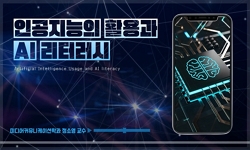This study serves as a starting point for exploring social studies education in the context of generative AI, using ChatGPT as a case study. It highlights six major questions to examine the issues and challenges surrounding social studies education. T...
http://chineseinput.net/에서 pinyin(병음)방식으로 중국어를 변환할 수 있습니다.
변환된 중국어를 복사하여 사용하시면 됩니다.
- 中文 을 입력하시려면 zhongwen을 입력하시고 space를누르시면됩니다.
- 北京 을 입력하시려면 beijing을 입력하시고 space를 누르시면 됩니다.

생성형 AI 시대 사회과교육의 과제에 대한 시론적 고찰 : ChatGPT 활용을 둘러싼 6가지 주요 질문들 = A Preliminary Study on the Challenges of Social Studies Education in the Era of Generative AI: Six Key Questions Surrounding the Use of ChatGPT
한글로보기https://www.riss.kr/link?id=A109127346
- 저자
- 발행기관
- 학술지명
- 권호사항
-
발행연도
2024
-
작성언어
Korean
- 주제어
-
등재정보
KCI등재
-
자료형태
학술저널
- 발행기관 URL
-
수록면
247-288(42쪽)
- DOI식별코드
- 제공처
-
0
상세조회 -
0
다운로드
부가정보
다국어 초록 (Multilingual Abstract)
This study serves as a starting point for exploring social studies education in the context of generative AI, using ChatGPT as a case study. It highlights six major questions to examine the issues and challenges surrounding social studies education. The study results are as follows: First, the problem of plagiarism with the use of generative AI is becoming prominent, which demands a philosophical and educational reconceptualization of what constitutes production and creative activities. In the educational aspect, the threat to educational activities aimed at enhancing students' capabilities is a more fundamental issue than plagiarism. Second, to counteract AI hallucinations and biases, critical thinking, one of the higher-order thinking skills in social studies, and critical literacy, a key element of digital citizenship, are important. Third, due to differences in already internalized competencies among students, there is a potential for an educational gap in the level of generative AI utilization. Additionally, the monetization policies of generative AI companies could undermine educational equity. Fourth, the traditional teacher-centered method of delivering educational services is no longer effective in the digital age. The advent of generative AI is expected to promote the emergence of 'learners and instructors as prosumers', disrupting the traditional relationship between teachers as providers and students as consumers of educational services. Fifth, if generative AI accelerates the transformation of learners into digital prosumers, metacognitive skills will gain more attention in social studies classes. This will require social studies teachers to look beyond students' metacognition and guide the learning process. Finally, to develop the ability to ask quality questions, social studies teaching and learning strategies may need to pursue a dual approach. One strategy involves actively utilizing prompts to cultivate metacognitive skills, while the other strategy involves isolating the classroom from the external world to develop basic thinking skills.
동일학술지(권/호) 다른 논문
-
- 한국사회과교육학회
- 구정화
- 2024
- KCI등재
-
초등 글로벌 이슈 중심 사회과 프로젝트 수업이 세계시민성 함양에 미치는 영향
- 한국사회과교육학회
- 오고은
- 2024
- KCI등재
-
- 한국사회과교육학회
- 홍승표
- 2024
- KCI등재
-
사회과 경제 수업에서 데이터 기반 문제중심학습(PBL) 모형 개발과 효과 분석
- 한국사회과교육학회
- 하준호
- 2024
- KCI등재




 KCI
KCI KISS
KISS






